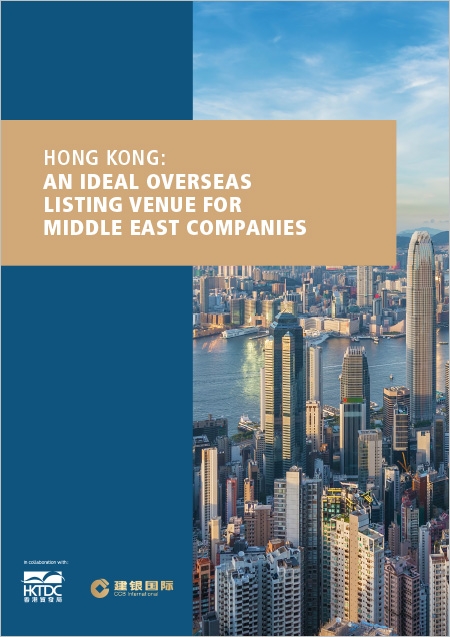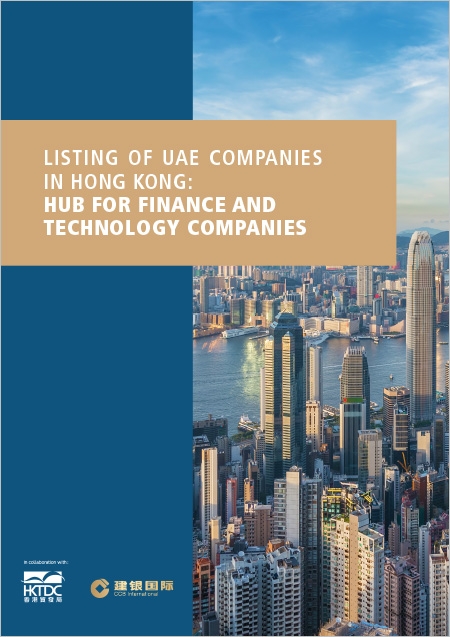Diversification blueprints and growing ties with China possess significant opportunities to attract Middle East companies to list in Hong Kong
The Kingdom of Saudi Arabia (KSA) and the United Arab Emirates (UAE) have been committed to economic diversification in recent years, and have launched a variety of ambitious economic blueprints, highlighting the importance of the private sector to expedite economic transformation.
The equities market is an increasingly important conduit to channel funds from investors to private sector companies to support their funding needs. Middle East stock exchanges have seen remarkable records in initial public offerings (IPOs) in recent years. Bourses in KSA, Dubai (UAE) and Abu Dhabi (UAE) all ranked among the world’s top 10 in 2022 in terms of IPO funds raised.
However, overseas listings of Middle East companies, primary, dual‑primary and secondary included, are far from prominent. In fact, the Saudi Stock Exchange (Tadawul) has only recently begun to actively foster international co‑operation with international exchanges such as the Shanghai Stock Exchange (SSE) and the Hong Kong Stock Exchange (HKEx). Notably, the first example of dual listing between Tadawul and the Abu Dhabi Securities Exchange (ADX) for a UAE‑headquartered company took place only in December 2022.
Nevertheless, against the backdrop of the growing Sino‑Middle East economic ties, as well as the fast‑transforming Middle East economies, there are significant opportunities to attract Middle East companies to list in Hong Kong. Of particular note, HKEx announced in September this year that it had added Tadawul as a Recognised Stock Exchange, a development that allows companies with a primary listing on Tadawul’s Main Market to apply for a secondary listing in Hong Kong.

Hong Kong: An Ideal Overseas Listing Venue for Middle East Companies |

Listing of UAE Companies in Hong Kong: Hub for Finance and Technology Companies |
HKTDC Research conducted in‑depth interviews with industry experts and practitioners from both the KSA and the UAE to better understand the drivers and obstacles for Middle East companies considering overseas listings, and their views on the city as their preferred listing destination:
Motives for seeking overseas listings in Hong Kong
- Rising demand to finance overseas expansion under economic diversification blueprints
KSA and UAE companies are increasingly seeking to expand beyond their local markets, driven mainly by the pressing need for economic growth and diversification to shift away from heavy oil and gas dependence.
- Rising economic ties with Asia, particularly China
Asia’s fast‑growing economy provides a more diverse clientele for KSA and UAE companies considering diversification, both in terms of markets and industry.
Hong Kong’s appeal for Middle East companies
- Gateway to lucrative Asian market
Strategically located as the gateway to Asia in general – and, in particular, to mainland China and the ASEAN bloc – Hong Kong has considerable appeal for UAE and KSA companies.
- Proof of good governance
Hong Kong adopts a prudent framework that places the emphasis on investor protection and education. Successful HKEx listings can therefore effectively demonstrate a company’s commitments to international standards and good corporate governance.
- Prominent international financial centre increases the visibility of the companies
The Hong Kong stock market is well‑connected to global investors. Overseas investors’ contribution accounted for 41.2% of the cash market transactions in 2020.
- Superb market breadth and depth gives access to a huge investor pool and liquidity
The HKEx has consistently been ranked as one of the top 10 largest stock markets in the world in terms of market capitalisation. In addition, Hong Kong has been the world’s largest IPO market seven times in the past 14 years.
Key challenges for Middle East companies seeking Hong Kong listings
- Language barrier and cultural difference
English is not widely spoken among businesspeople and investor communities in some parts of the Middle East. On cultural front, working days in the KSA for example, are from Sunday to Thursday.
- Difference in Listing, Compliance, Disclosure and ESG Requirements
The HKEx requires listed companies to publish ESG reports on a regular basis. While these requirements effectively showcase listing companies’ commitments towards good corporate governance and social responsibility, Middle East companies can find it difficult to meet the ESG standards in Hong Kong, particularly in the social dimension, in which the concept of diversity in companies may differ from that deemed standard in Hong Kong.
Recommendations
- Strengthen connectivity with the Middle East
Governments in the Middle East play a significant role in guiding the direction for the business sector. Many interviewees extolled the delegation led by HKSAR Chief Executive John Lee to the KSA and UAE in early 2023 as a vital and game‑changing move to attract dual listing candidates from the Middle East.
- Make greater marketing efforts
Middle East companies and decision makers are still to be better informed about the potential benefits of listing in Hong Kong.
Target sectors
Interviewees identified several Middle East business sectors with companies likely to particularly benefit most from listing in Hong Kong:
- Energy and renewable energy
Despite having a clear vision to expand the non‑oil economy, many energy‑related sectors, such as petrochemicals, oil, materials and mining ,remain important for the economic development of the KSA and the UAE.
- Healthcare and high-tech
An increasing number of Middle East healthcare companies, often family businesses, are actively seeking substantial investments from Asia to leverage opportunities offered by the region’s large population size.
- Infrastructure
Under its ambitious economic diversification blueprint, the KSA has emerged as a country with significant demand for urban and infrastructure development. At the same time, construction companies in the UAE aim to fuel their expansion and reduce overall risk by accessing capital from global sources.
- Finance
The financial services sector is one of the largest non‑oil sectors in the region. This holds great promise for Hong Kong as financial institutions from the Middle East are increasingly seeking to follow their clients into Asia, where Hong Kong serves as an international financial centre and the gateway to the wider regional market.
The opinions and views expressed are those of the interviewees and do not necessarily reflect the views of CCB International or the HKTDC. CCB International and the HKTDC shall in no way be responsible for the accuracy, completeness or timeliness of the information provided by third parties, and for any loss associated with the use of such information.
Note: This article forms part of a joint study conducted by HKTDC Research in collaboration with CCB International: “Hong Kong: An Ideal Overseas Listing Venue for Middle East Companies”.
Related link HKTDC Research


